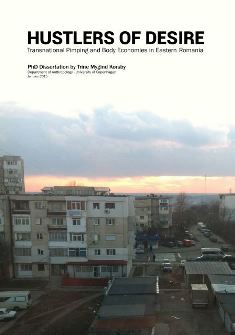PhD Dissertation: Hustlers of desire
- Transnational pimping and body economies in Eastern Romania
PhD Dissertation by Trine Mygind Korsby
This dissertation investigates the lives and practices of a group of Romanian pimps, who carry out their pimping business both locally and transnationally – and for some of them, their activities turn into human trafficking. Set in Galați, an industrial city in eastern Romania, the dissertation explores the key role of desire in the business of pimping. It shows how pimping is set in motion and driven by desire: sexual desire, desire for money, desire for love, desire for particular material objects and the desire to take care of one’s family. Furthermore, the ability to read the desires of others is a distinct skill, which is valuable to both the pimps and the women in their business.
 Through this focus on desire the main issues discussed in the dissertation are transnational criminal livelihoods in a post-socialist landscape, the gendered, intensified body, and the moral economy of people who – within the context of human trafficking and the sex industry – are often considered immoral.
Through this focus on desire the main issues discussed in the dissertation are transnational criminal livelihoods in a post-socialist landscape, the gendered, intensified body, and the moral economy of people who – within the context of human trafficking and the sex industry – are often considered immoral.
The dissertation follows a group of transnational pimps in their daily lives, business practices and social relations, with the topography of the post-socialist city of Galați as their physical and social point of departure. The dissertation explores the financial transactions, work ethics and body politics in the field of transnational pimping through the concept of body economies. It illuminates the skills of pimping, the pimps’ navigation in their working-class neighbourhood and family relationships, their attempts at intertwining legal and illegal work domains, and their endeavours to establish a business abroad.
By tracing the pimps’ moral evaluations of their business locally and abroad in countries such as Italy and Switzerland, the inner and outer moral worlds of the pimps are investigated with particular focus on the body as a container of a moral state. Analysing the relationships between the pimps and their sex workers, the dissertation examines the becoming of a particular body as a locus of desire, and its aesthetics, objectification and value, and shows how intensified versions of femaleness and maleness are given form in the field of pimping. It is argued that for the sex workers, achieving the ‘right’ body entails a certain femininity, expressed through body techniques of beautification, clothes and nail polish. These body techniques are analysed as an attendance to an inner condition of femininity, which I argue is extracted from within and brought to the outside of the body. In this way, the resonance between the internal and the external to the body is illuminated as central to the body economies of pimping.
By investigating the move of pimps and sex workers from their neighbourhood in Galați to various destination countries, another main argument of the dissertation is that body economies are locally anchored. This means that the skilful, condensed bodies of pimp and sex worker are pressurised in new countries and contexts, which do not afford the same multiplicity as the home turf in Galați with its well-known landscape and complexity of relations including family, friends, neighbours and business partners. In the new context, many pimp-sex worker relationships therefore escalate into conflict and sometimes physical violence. However, whereas the sex worker body remains able to not only perform, but also to transform itself and avail itself of new opportunities in the destination country, the pimp body freezes into unidimensionality, or ‘monoformity’, as the bad perpetrator and immigrant urban outcast.
The dissertation thus zooms in on the relationality, skills and bodily forms of transnational pimping and argues that the pair of the pimp and the sex worker be regarded as a ‘site’ in which different kinds of desire are gathered and produced.
You can purchase the dissertation at Academic Books (academicbooks.com), Øster Farimagsgade 5, DK-1353 Copenhagen K.
